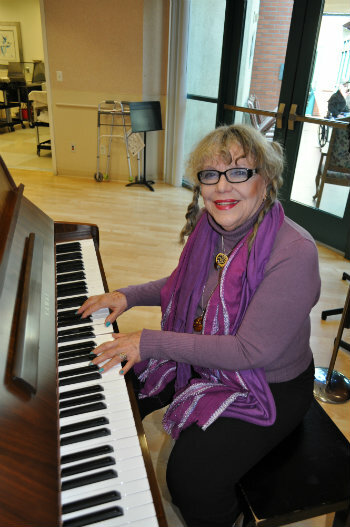Michal Robins: Living Life to the Fullest


Michal Robins: Living Life to the Fullest
The meaning of life is to find your gift.
The purpose of life is to give it away.
~ Pablo Picasso
Finding one’s gift is often a lifelong pursuit. Sadly, many people never realize their gift, and others do but fail to act. For those who do realize their gift, it can become the driving force in their lives, enabling them to accomplish much, often beyond their dreams. Some fortunate individuals are blessed with multiple gifts, which combine to create a very interesting and meaningful life.
Los Angeles Jewish Home resident Michal Robins, age 75, is a musician, composer, singer, researcher, writer, and behavior therapist. As a young woman, she worked as a model in Israel and studied music at The Juilliard School; as an adult, she developed homes for people with developmental disabilities and provided music therapy at senior centers. Her talents have taken her from performing at the legendary Copacabana in New York City to opening a day care center for the elderly and disabled individuals in California. Her unique combination of gifts have led her to live a most interesting life.

Michal began studying piano with her mother at the tender age of four. Soon she was playing classical music and improvising jazz. Her musical talent resulted in a scholarship to Juilliard. After her studies, she returned to Israel, where she met her future husband, an American who volunteered in the Israeli Defense Forces (IDF) as a paratrooper. The couple lived in New York and Israel, and had three sons, Gabriel, Sinai and Shani. Michal continued her career as a singer, accompanying herself on the piano.
After 14 years of marriage, the couple went their separate ways; Michal and her sons relocated to Los Angeles, where she continued to pursue a career in musical entertainment. As the show business world began to lose its patina, Michal, now age 36, returned to school to pursue another interest: psychology. She first earned a bachelor’s degree in biology, then master’s degrees in clinical and experimental psychology. Her sons, motivated by her academic accomplishments, would go on to earn Ph.Ds. and become university professors, specializing in mathematics, computer science, and psychology, respectively.
Michal began her new career as a therapist and conducted workshops in anger prevention for universities and community organizations. She specialized in providing services to young autistic adults, helping them realize their own gifts. Her crowning achievement was collaborating with her son Shani to create The Wisdom Center, a state-of-the-art adult health day care (ADHC) center, offering extensive health services and activity programs for seniors and individuals with disabilities. Michal’s goal was to bring happiness into their everyday lives. As the economy turned downward and expenses rose, she had no choice but to make the difficult decision to close down the center.
“That was the saddest time in all of my careers,” says Michal. Not only had she lost all of her savings, she felt she had lost her purpose. Months passed as she searched for a way to try to find a similar path again. “I was lost.” Her sons, who knew how important giving is to her, became concerned about her state of mind. One day, they approached her with an idea: consider moving to the Jewish Home. They believed that at the Home, their mother would receive any help she needed, and, in return, she could help others by sharing her skills and knowledge. That was two and a half years ago, and Michal has not looked back. “The Jewish Home has totally rejuvenated me! Since the Home provides everything I need, I can devote my time to helping others and sharing my positive philosophy of life. It is so rewarding to share my experience with others.”
At the Home, Michal has created a new life, combining her two loves: music and helping others. She leads daily music sessions and entertainment for residents, provides musical accompaniment at Shabbat services, and teaches piano to members of the Home’s dietary staff. Michal also facilitates a class on staying young by appreciating the little things in life and diminishing negative thoughts, using her skills to help others navigate their own paths. She also finds time to write for the Home’s Chai Journal resident newsletter, plays piano for the resident choir, and teaches a weekly class in conversational Hebrew.
“I am by far the happiest I’ve ever been,” exclaims Michal. “I do exactly what I love to do, and I have so much fun doing it. It’s terrific!” She is living her personal motto – “Live, love, laugh, let it go, and let it be.”
Michal also has some sage advice for healthy aging. “Feel well – think young, take care of yourself and don’t focus on aches and pains; enjoy your time with friends, old and new; have fun doing whatever you enjoy; and give of yourself to others. It is amazing…The more you give and do for others, the more energized and happy you will be.”
Michal is preparing to take rabbinical and cantorial classes at American Jewish University. “There’s always so much more to learn,” she says.
At 75, she’s only just begun.